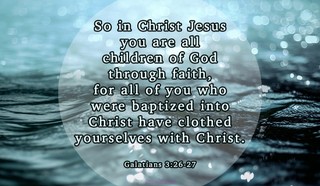- Recent Translations
- All Translations
Galatians 3:22
Share
Settings
Galatians 3:22 in Other Translations
Galatians 3:22 Meaning and Commentary
But the Scripture hath concluded all under sin
By the "Scripture" is meant, either the writing of the law in particular, the killing letter, or the whole Scripture, or God in it; and who by and in it has shown, declared, and proved, that all the individuals of human nature, Jews and Gentiles, and all that is in them, and done by them, are under the power and dominion of sin, defiled by it, and involved in the guilt of it; for it is not (pantav) , "all persons", but (panta) , "all things", belonging to all persons; all the members of their bodies, and faculties of their souls; all their thoughts, inclinations, and intentions; all their works and services, even their best righteousness, which is as filthy rags; all are declared to be sinful and polluted, and men on account of them to be guilty before God, and liable to punishment; from whence there can be no escape by the law of works; for they are like men concluded, or shut up in a prison, from which there is no apparent likelihood of deliverance: now the Spirit of God, discovering to men this their wretched and desperate condition, under the law and sin, reveals Christ and his righteousness to them, and enables and encourages them to believe in him, by whom only they can be justified from all things, they cannot by the law of Moses, in which they see themselves shut up, as in a prison:
that the promise by faith of Jesus Christ might be given to them
that believe;
by the "promise" is intended, the promise of life and salvation, and particularly of a justifying righteousness; which is given, not merited; righteousness is a gift, a gift of grace, a free gift, and so is eternal life; salvation in all its parts is of free grace; Christ is a free gift, and so are all things along with him; yea, faith itself, by which they are received, it is not of ourselves, it is the gift of God; Christ is the author and finisher, as well as the object of it; and therefore here called "the faith of Jesus Christ": and such that have it, to them the promise, or the things promised, righteousness and life are given, which the law could not give; not to them that work, but to them that believe: thus the law is so far from being against the promises of God, that it is subservient to them; for though the law has no tendency in itself to bring persons to Christ, and to believe in him for righteousness, yet this concluding men under sin, showing them their desperate, and hopeless, and helpless condition, the Spirit of God takes occasion from hence to reveal Christ unto them, and to enable them as perishing creatures to venture on him, and lay hold on the hope set before them in the Gospel; and so they come to enjoy the grand promise of it, even life and salvation by Christ.
Galatians 3:22 In-Context
Videos for Galatians 3:22
Cross References 1
-
1.
Romans 3:9-19 ;Romans 11:32

